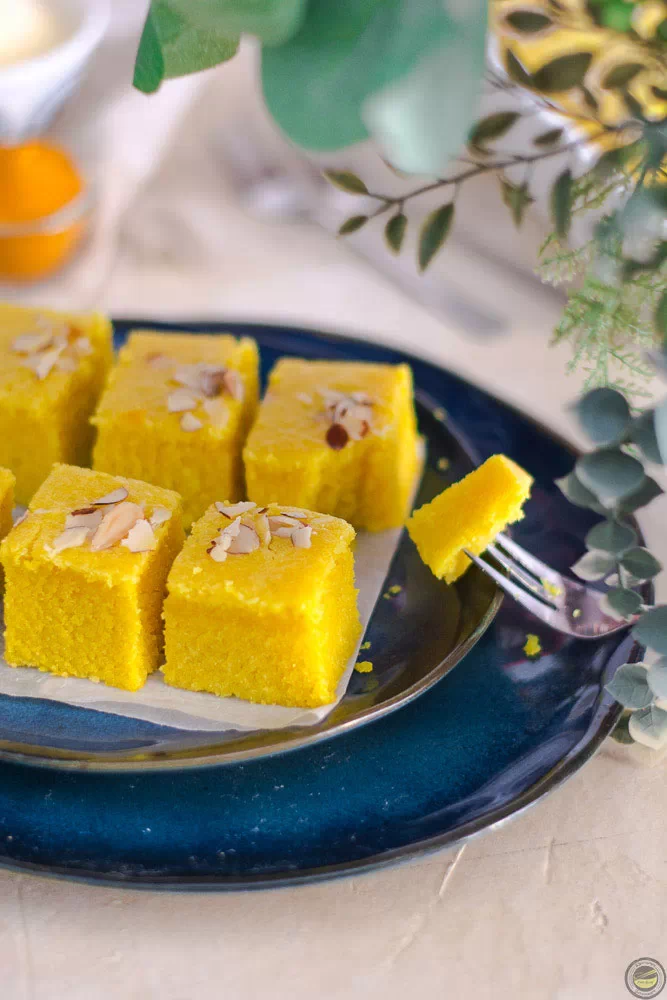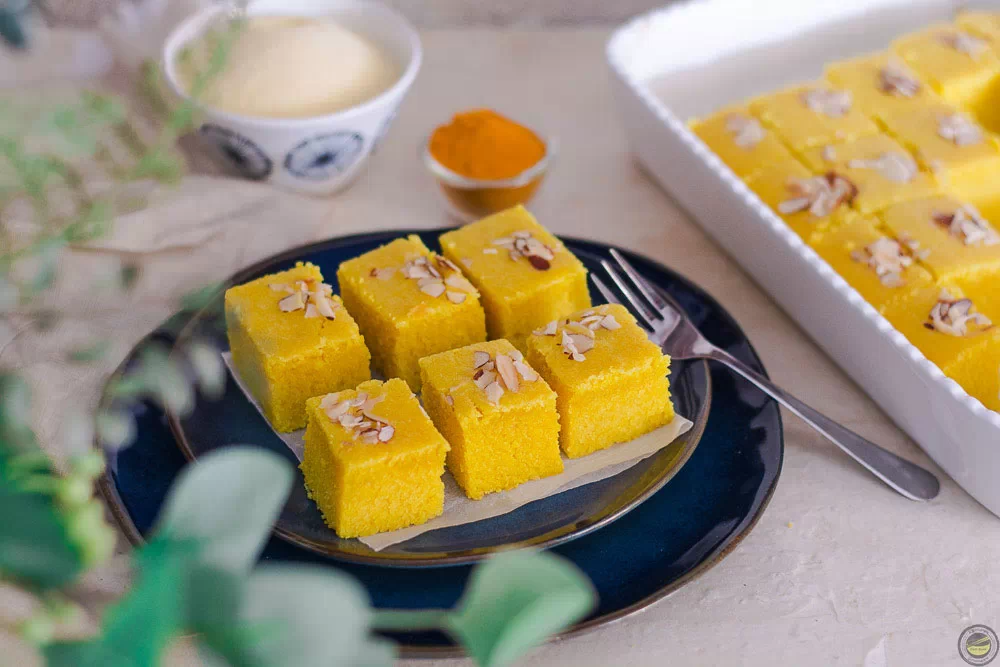Questo articolo è disponibile anche in: ![]() Italian
Italian
Today we are going to enjoy a delicious Lebanese cake called Sfouf, made with semolina and turmeric. This semolina cake recipe is very famous and popular all over the Middle East. It is a compact cake, but at the same time it’s soft and tasty. This cake can be flavoured with orange blossom water that gives it a really delicious and delicate flavour.

Origins and Meanings of Lebanese Cake
Sfouf originated in Lebanon, but is also very popular in countries such as Syria, Jordan, and Palestine. This cake has existed in the Middle East for centuries, but it is not known when. Some theorise that it was even created by the Phoenicians, but this remains a theory. The only thing that is known is that it originated in the Lebanon region.
This Lebanese Cake, made with simple ingredients, is not just a typical recipe, but has many religious/cultural meanings. This traditional cake is served during religious festivals, special occasions such as weddings and family gatherings. During and at the end of Ramadan, according to the customs of the country, and at Christian Easter.
It is seen as a symbol of hospitality to be offered to a guest, as a means of spreading culture. It is a symbol of family tradition, as the recipe is handed down from one generation to the next, creating a link with the past.
It’s still served on special occasions, but the recipe has evolved with the addition of certain ingredients. Likewise, it has also become very popular in other countries, especially where the Middle Eastern community is large and well-established.
The word Sfouf translates as ‘lines’ or ‘rows’. It is cut into rhomboids and each rhombus has a pine nut on it, creating real lines.
It is a moist semolina cake, a truly healthy dessert. Not only that, but it uses simple ingredients, such as semolina, which is an excellent source of protein and fibre, and turmeric, which has many benefits such as anti-inflammatory and antioxidant properties. Not to mention, it contains no butter or eggs, making it perfect for vegetarians and vegans.
In Lebanon, Sfouf is made with aniseed or sesame seeds as well as pine nuts. In Palestine, orange blossom water is added, and in Jordan it is garnished with pistachios or almonds.
Semolina Cake Recipes
Semolina desserts can be found in many typical cuisines from the Middle East to Italy. Lebanese desserts include Sfouf and Nammourà, which is widespread in different regions such as Greece, Turkey, and Syria. Made with semolina, butter, water and yeast, it is soaked in sugar syrup and orange blossom water after cooking. The Greek Galaktoboureko cake is made with milk semolina cream wrapped in puff pastry soaked in syrup. In Italy, we have Migliaccio Napoletano, made with semolina, ricotta and citrus peel, typical of the Neapolitan Carnival. And these are just a few cakes, all very simple and genuine but tasty sweets, rooted in the traditions of the area, precisely because they are made with poor ingredients.
Preparing Turmeric Sfouf
Brush a 30×35 cm baking tin with tahina and set aside. After weighing all the ingredients, sift the flour, turmeric, and baking powder into a bowl. Add the semolina, sugar, and salt. Add the milk, water, and orange blossom water to the dry ingredients and mix well. Pour the oil into the bowl and continue to mix. The dough will not form immediately, you will need to stir for a few minutes until it comes together perfectly.
When the dough is ready, pour it into the baking tin and place pine nuts in the centre of what will be a slice, if you like you can use pistachios or almonds. I ‘personalised’ mine by sprinkling the surface with slivered almonds.
Heat the oven to 180 °C. When hot, bake for 25 minutes. Once cooked and cooled, cut the Lebanese Cake into diamond shapes or squares.
If you are looking for Easter cakes ideas, this could be a good option, it is simple, quick, and delicious. Store in an airtight container for up to 3–4 days.

Lebanese Sfouf Cake
Ingredienti
- 365 g of Semolina Flour
- 275 g of Pastry Flour
- 7 g of Baking Powder
- 2 g of Salt
- 300 g of Caster Sugar
- 3 g of Turmeric
- 365 g of Milk
- 100 g of Water
- 100 g of Sunflower Oil
- To taste Orange Blossom Water
- To taste Almonds
- 1-2 tsp of Tahina
Istruzioni
- Combine 365 g of Semolina Flour, 2 g of Salt and 300 g of Caster Sugar in a large bowl. Sift 275 g of Pastry Flour with 7 g of Baking Powder and 3 g of Turmeric and mix all dry ingredients together.
- Add 365 g of Milk, To taste Orange Blossom Water and 100 g of Water. Mix well and add 100 g of Sunflower Oil. It will take a few minutes for the mixture to become smooth.
- Brush a large cake tin (approx. 30 x 35 cm) with 1-2 tsp of Tahina.
- Pour in the dough and add as many almonds or pine nuts where you imagine the centre of the slice.
- Let the dough rest for 30 minutes.
- Heat the oven to 180 °C. Once ready, bake the dough for 25 minutes.
- Once the Sfouf is cooked, take it out of the oven and let it cool completely before cutting it.
- Store the slices in an airtight container, they will last for at least 3 days.
Nutrizione
Le informazioni nutrizionali mostrate sono una stima fornita da un calcolatore nutrizionale online. Non deve essere considerato un sostituto del consiglio di un nutrizionista professionista.
